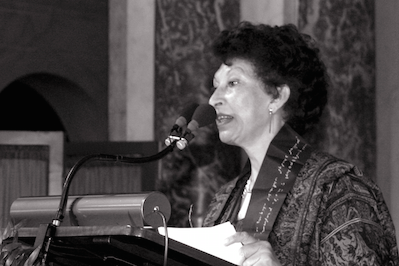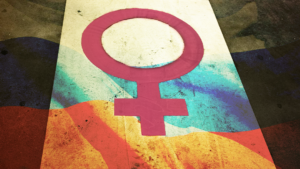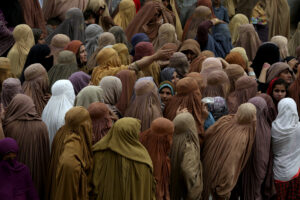Truthdigger of the Week: Fatema Mernissi, a Founder of Islamic Feminism
The original research of the erudite sociologist, who died Nov. 30, showed that the subjugation of women in Muslim societies has no basis in the Quran and other Islamic scriptures. "Islam was not sent from heaven to foster egotism and mediocrity," she wrote. Fatema Mernissi was one of the founders of Islamic feminism. (Vysotsky / CC BY-SA 4.0)
Fatema Mernissi was one of the founders of Islamic feminism. (Vysotsky / CC BY-SA 4.0)
Every week the Truthdig editorial staff selects a Truthdigger of the Week, a group or person worthy of recognition for speaking truth to power, breaking the story or blowing the whistle. It is not a lifetime achievement award. Rather, we’re looking for newsmakers whose actions in a given week are worth celebrating.
Born in a domestic harem in Fez, Morocco, in 1940, acclaimed sociologist Fatema (also Fatima) Mernissi grew up with a unique perspective on the Islamic world. At an early age, she learned from a young Sudanese girl who was a servant in the harem that “the frontier indicates the line of power because wherever there is a frontier, there are two kinds of creatures walking on Allah’s earth, the powerful on one side, and the powerless on the other.” [Editor’s note: In her book “Dreams of Trespass,” Mernissi described post-1909 domestic harems as “in fact extended families … with no slaves and no eunuchs, and often with monogamous couples, but who carried on the tradition of women’s seclusion,” in contrast to the imperial harems perhaps best known to Westerners from the “Arabian Nights” tales.]
Mernissi understood then, in the isolation of her home — and behind the veil she had to wear whenever she was allowed to leave the harem, always accompanied by a man — that she was one of the powerless.
As Morocco gained its independence from France in 1956 and domestic harems were banned, a nationalist push allowed her to attend school and, later, to graduate from university. She obtained degrees from Mohammed V University in Rabat, Morocco, and the Sorbonne in Paris as well as earning a Ph.D. in sociology from Brandeis University. Based on Mernissi’s doctoral dissertation, her first book was titled “Beyond the Veil: Male-Female Dynamics in Modern Muslim Society.” It “examines Islam from a feminist perspective and critiques traditional, male-dominated interpretations,” and its publication set her on the path to becoming one of the founders of Islamic feminism.
A devout Muslim, Mernissi found proof in history and in Islamic texts that the subjugation of women was a male machination justified by “manipulations” of sacred texts. She found no evidence in the Quran and other scriptures that Muslim men were meant to dominate women. “The elite faction is trying to convince us that their egotistic, highly subjective and mediocre view of culture and society has a sacred basis,” she wrote. “But if there is one thing that the women and men of the late 20th century who have an awareness and enjoyment of history can be sure of, it is that Islam was not sent from heaven to foster egotism and mediocrity.”
Her bold readings initially attracted criticism and even protest, according to The Guardian:
Fatima’s interpretations and deconstructions of the scriptures were iconoclastic to establishment Islam, [but] she was not, by and large, a target of formal censure, because of her rigorous scholarship, her respect for and adherence to the Qur’an, her demonstrated intellectual expertise with the Qur’an and the Hadith (the sayings attributed to the Prophet) and their many concordances. Her empathetic style and her elegant use of jadal—reasoned and logical argumentation, itself a Qur’anic mode—kept the hecklers away.
In her book “Islam and Democracy,” published in 1992, the feminist thinker also analyzed the role that the first Gulf war had in turning the Arab world against the idea of democracy, a concept many have come to conflate with “violence and religion in the west, as perceived by Arab observers of American broadcasts.”
After a life dedicated to feminist Muslim scholarship as well as to work on “civil society, democracy and the digital revolution,” the writer died of cancer on Nov. 30, 2015, at a clinic in Rabat.
For her widening of the scope of progressive feminism to include the important perspectives of women in the Arab world as well as her defiance of conservative elites who use Islam to oppress women, Fatema Mernissi is our Truthdigger of the Week.
Your support matters…Independent journalism is under threat and overshadowed by heavily funded mainstream media.
You can help level the playing field. Become a member.
Your tax-deductible contribution keeps us digging beneath the headlines to give you thought-provoking, investigative reporting and analysis that unearths what's really happening- without compromise.
Give today to support our courageous, independent journalists.






You need to be a supporter to comment.
There are currently no responses to this article.
Be the first to respond.